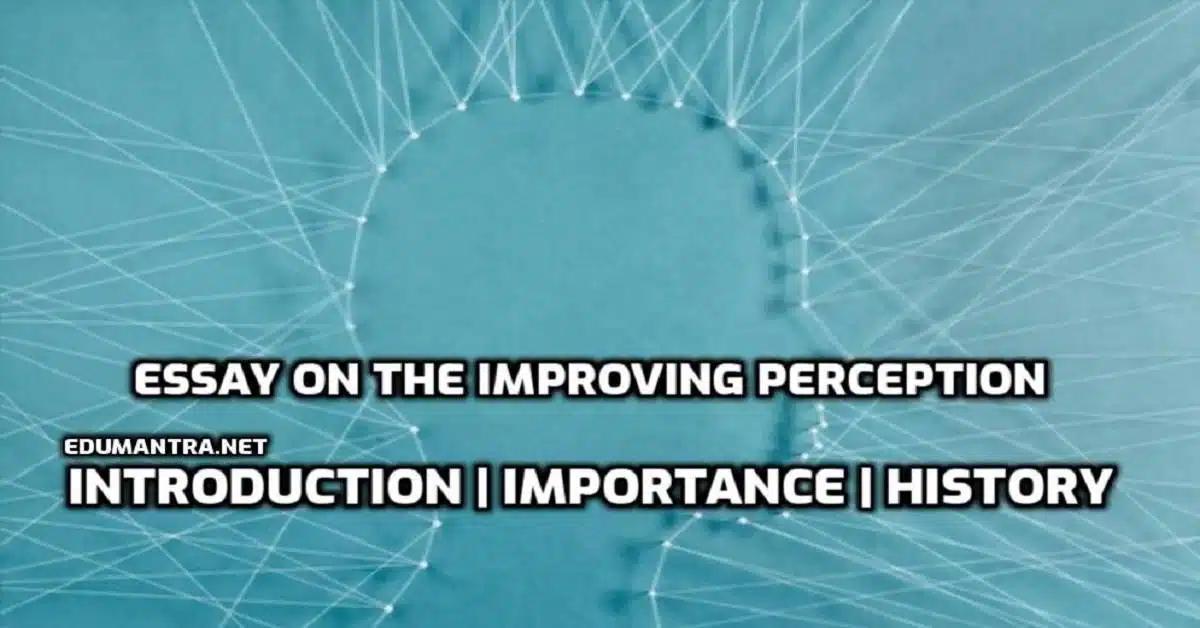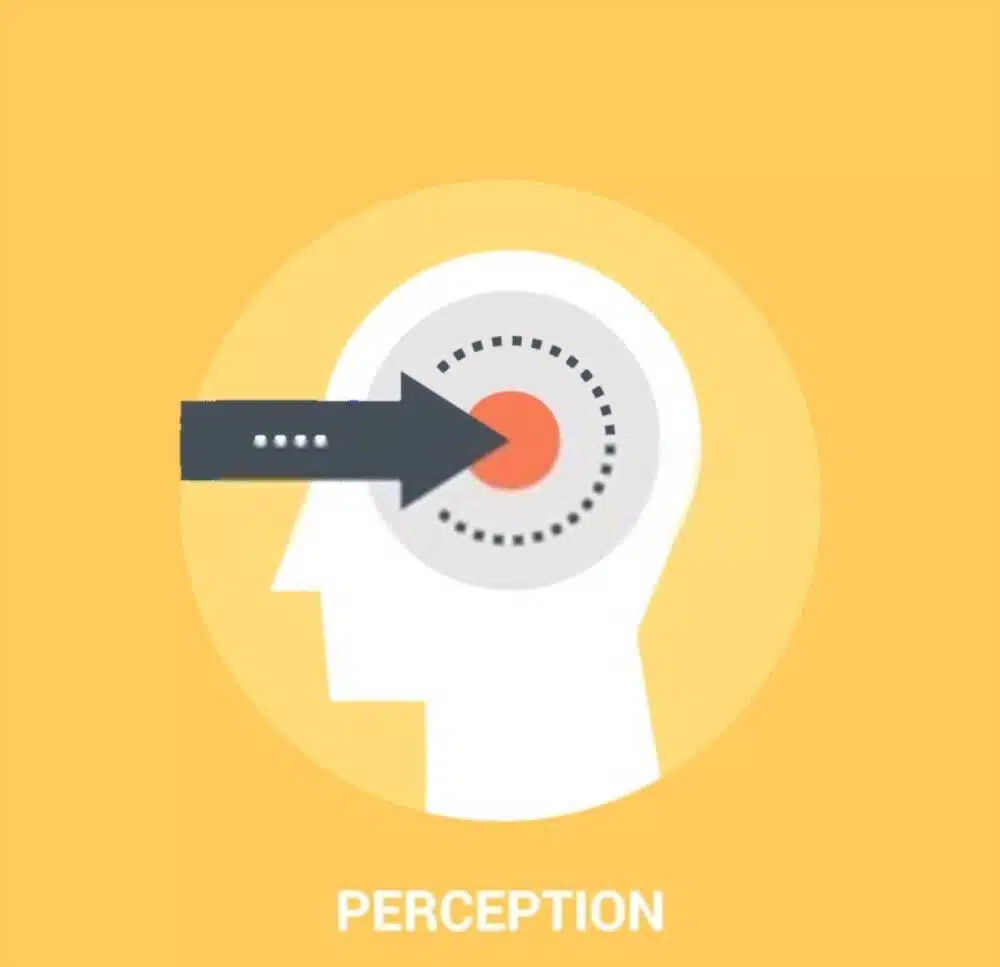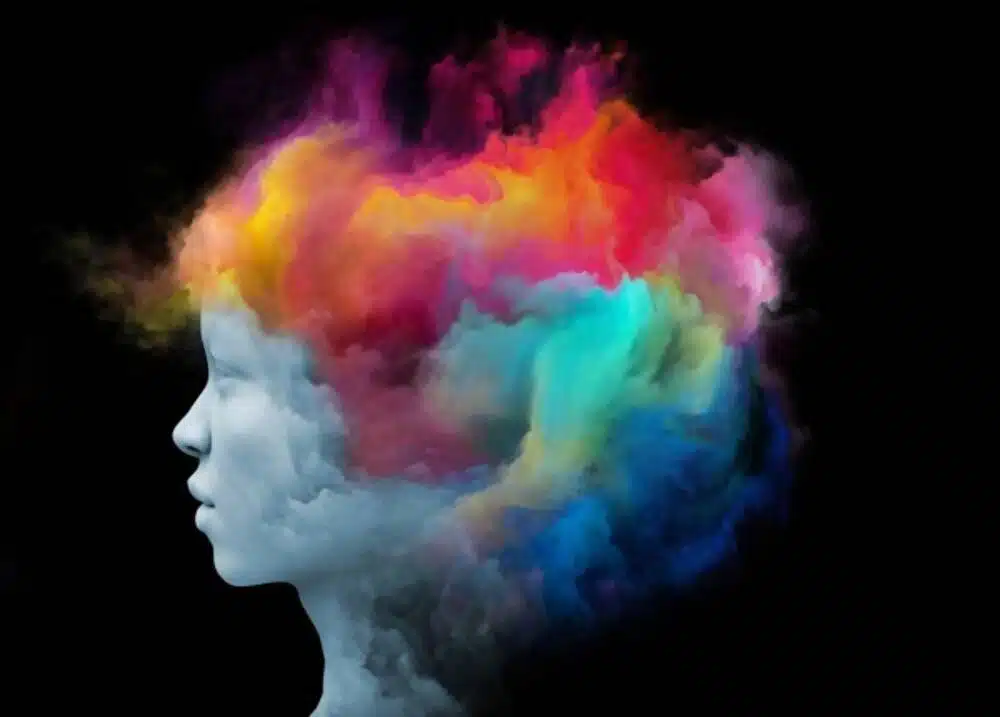
Essay on the Improving Perception – This essay on perception and the nature of reality examines some basic questions about how humans perceive their environment.
The Importance of Perception

Perception plays a very important role in our lives. Perception is defined as the process of taking in and understanding information from the environment (Boring, 1996).
Perception can be thought of as the act of creating a mental image or representation of what we see around us. This image can then be used to make decisions and judgments about what we see.
Perception is essential for everyday living. For example, we need to perceive when someone is looking at us in order to understand what they are saying. We also use perception to understand how people are feeling based on their facial expressions. Perception is also important for tasks such as driving, cooking, and playing sports.
There are many different types of perception that we use every day. Some examples include visual perception, auditory perception, olfactory perception, gustatory perception, tactile perception, and vestibular perception. Each type of perception has its own special abilities that allow us to interact with the world around us.
Visual perception is one of the most important types of perception because it allows us to see the world around us. Visual perceptions take in information through our eyes and create a mental image or representation of what we see. This image can then be used to make decisions and judgments about what we see. Visual perceptions include things like reading comprehension, recognizing faces, and understanding maps.
Auditory perception allows us to hear the world around us. Auditory perceptions take in information through our ears and create.
Introduction
In today’s world, it feels like everything is changing at an alarming rate. From the way we communicate to the way we consume information, there seems to be no stopping the progress of technology.
In some ways, this is a good thing—we are constantly evolving and learning new things. However, there are also some downsides to this rapid change. One of these is the way we perceive the world around us. For example, take the current trend of New Age spirituality.
While it may have started out as a positive movement, it has now been tainted by unfounded claims and dubious practices. This is not a problem that only affects spiritual matters—the same thing can be said for many other areas of our lives.
For example, in the past few years, there has been a rising trend of “fake news”. This is media that is deliberately misleading or outright false in order to generate clicks or shares.
As you can see, our perception of the world around us is constantly changing and evolving. How we see things can have a big impact on how we act and what we do.
In this essay, we will explore how improving our perception can lead to improved outcomes in our lives
Ways to Improve the Perception-
- Increase Public Awareness: One way to improve the perception issue is to increase public awareness of it. This can be done by educating people about the problem, distributing information about how to improve perceptions, and working to raise public consciousness around the issue.
- Improve Communication Strategies: Another way to improve perceptions is through improved communication strategies. This can involve better understanding of how people perceive information, developing effective communication tools, and using those tools appropriately.
- Improve Perceptions of Scientists and Experts: Improving perceptions of scientists and experts can also help improve perceptions of their work. This could involve ensuring that scientists and experts are given a fair and accurate portrayal in the media, working to repair relationships damaged by perception issues, or engaging in other constructive efforts.
- Increase Transparency: Another way to improve perceptions is by increasing transparency around scientific research. This could involve making data more accessible, sharing study results early on in their development, and communicating with the public about what science is doing.
- Increased Accountability: Finally, increased accountability for scientific research can help improve perceptions of it by holding researchers accountable for the impacts their work has on society. This could involve creating laws or regulations that mandate disclosure of information related to scientific research, increasing funding for research that has positive social impacts, or any other measure designed to promote accountability
Ways Our Perceptions Affect Our Lives

Our perceptions plays an important role in our lives. Our perceptions can either improve or worsen our lives. For example, if we think that our life is bad, then we will likely try to do things to make our life better.
However, if we think that our life is good, then we are likely to relax and enjoy life. Perception also affects how we see ourselves. If we think that we are bad at something, then we are likely to try to avoid doing it. However, if we believe that we are good at something, then we may be more willing to attempt it.
Perception also affects how others see us. If they perceive us as being a good person, then they may treat us nicely. Conversely, if they perceive us as being a bad person, then they may treat us poorly. Perception can also affect how we feel about ourselves. If we think that our life is bad, then we may feel depressed and unhappy.
Conversely, if we think that our life is good, then we may feel happy and satisfied with life.
Perceptions can have a big impact on our lives because they dictate how motivated or discouraged we become and what actions or behaviours we choose to take based on those emotions
The History of the Perception Issue
Perception is an important element in the human experience. From the moment we are born, we are constantly learning and growing. Our perceptions of the world around us are shaped by what we are taught, what we observe, and our own experiences. We all have unique individual perceptions that make us who we are.
One of the most important aspects of perception is how people see themselves. Self-perception is how individuals view their own abilities, traits, and characteristics. People have different self-perceptions based on their backgrounds, experiences, education level, etc. This can determine how successful people are in life.
The Perception Issue was first introduced to the public in 1998 when researchers at Duke University published a study titled “The Imposter Phenomenon”. The Imposter Phenomenon refers to a phenomenon where people feel like they don’t belong or fit in with society or their environment. They may experience feelings of insecurity or loneliness because they feel like they don’t live up to people’s expectations or expectations of who they should be.
There are many factors that can contribute to someone feeling like an imposter including: identity formation (identity development), social interactions (social relationships), cultural influences (cultural identification), and physical appearance (body image). Each person experiences the Imposter Phenomenon differently based on their individual background and experiences.
Despite the fact that The Perception Issue is still debated by researchers and psychologists, it
Conclusion
Perception is a delicate thing. It can be easily swayed by our surroundings and the people around us. However, through education and awareness, we can work to improve our perception of the world around us. In this essay, I will provide you with some ideas on how to do just that.
By understanding different perspectives, learning about cultures and religions, and increasing your knowledge of history, you can begin to build a more tolerant society – one where everyone has an opportunity to be heard and respected.
People Also Ask :
1.Why is perception important?
Ans : Perception is everything. It shapes your thoughts, emotions, and actions. It can even determine the quality of your life.
2.What is perception explain?
Ans : Perception is the act of recognizing something as being what it is. It’s what you see, feel, hear or smell.
3.What are the 4 types of perception?
Ans : The four types of perception are sensation, thinking, feeling, and intuition.
4.How perceptions are formed?
Ans : Perception is the process by which people interpret and make sense of their environment. It begins with the sensory information we receive through our five senses, and then it is processed by our brains. Our brains use these interpretations to form beliefs, attitudes, and emotions.
5.What are the 5 characteristics of perception?
Ans : The five characteristics of perception are –
- Sensation- how something feels to the individual
- Perception- how an individual sees or understands something
- Cognition- the thought process that goes into what an individual perceives
- Memory- the recollection of past experiences and how they have influenced current perceptions
- Emotion- feelings that result from perceptions
6.What factors affect perception?
Ans : There are multiple factors that affect perception. Some of these factors include the environment, previous experience, cultural influences, and cognitive processes.
7.What is the power of perception?
Ans : The power of perception is the ability to see things the way we want to see them. It is the ability to control our own thoughts and feelings.
8.What are the principles of perceptions?
Ans : There are five fundamental principles of perception: Sensation, Intention, Expectancy, Cognition and Memory.